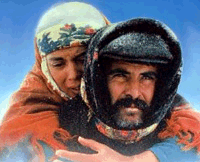At a “half-open” detention facility and work camp on the island of Imrali, a group of hopeful, but resigned men ritualistically converge on the entrance of the main penitentiary ward: first, for the disbursement of weekly mail and subsequently, for the eagerly anticipated posting of the list of prisoners authorized for a one-week furlough. A soft-spoken, unassuming man named Yusuf (Tuncay Akça), dispirited by the scarcity of letters from home, seemingly finds his fortune changed when he finds his name among the privileged list of furloughed prisoners. Mehmet (Halil Ergün), a pensive and conflicted man faces his trip to Diyarbakir with great trepidation and anxiety, having found his marriage increasingly strained when his wife begins to question his role in her brother’s death during a bungled robbery. A vibrant and self-assured young man, Mevlat (Hikmet Çelik), finds his romantic notions to reunite with his fiancée Meral (Sevda Aktolga) thwarted when her family dispatches chaperones in order to prevent the couple from being alone. An idealistic and apolitical man named Omer (Necmettin Çobanoglu) who daydreams of his idyllic life amid the lush, grazing open fields of his beloved village in Kurdistan returns home to the chaotic sight of his town under siege by the military as they attempt to root out suspected insurgents in the closely knit community. A rugged, unemotional prisoner named Seyit (Tarik Akan) receives a letter from his family explaining that his wife Ziné (Serif Sezer) had dishonored their clan by resorting to prostitution, and was sent with their son to her parents’ home at a mountain village in the frozen hinterlands. Now issued a temporary permit to return home, he vows to redress the shame of his wife’s infidelity and restore honor to both families.
Realized on film by Yilmaz Güney’s assistant director Serif Gören based on the screenplay by – and technical direction of – imprisoned political prisoner, author, actor, and filmmaker Güney, Yol is an elegantly spare, haunting, and socially relevant portrait of repression, tyranny, isolation, and inhumanity. By juxtaposing images of transnational public transportation (in particular, trains and rural buses) and varied landscape that characterize the disparate paths of the furloughed prisoners, Güney illustrates, not only the country’s innate cultural and ethnographic diversity, but more importantly, the universality of oppression and the erosive, incalculable toll of Turkey’s continuing political and socio-economic instability following the military coup of 1960 and subsequent military interventions of 1971 and 1980. Moreover, through repeated episodes of martial law curfews, random check points and inspections, and civilian searches, Güney draws an implicit parallel in the paradoxical status of the conditionally liberated prisoners with the broader depiction of curtailed personal freedom among the general population under the nation’s military rule. Inevitably, the sad, often tragic plight of the prisoners’ elusive search for a sense of normalcy serves, not only as a microcosmic representation of life under political instability and a repressive regime, but also as a distilled and elementally human contemporary document of desolation, struggle, compassion, and perseverance.
© Acquarello 2004. All rights reserved.
